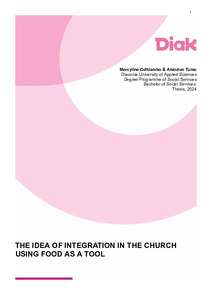The Idea of Integration in the Church using Food as a Tool
Tumo, Abiodun; Odhiambo, Mercyline (2024)
Tumo, Abiodun
Odhiambo, Mercyline
2024
All rights reserved. This publication is copyrighted. You may download, display and print it for Your own personal use. Commercial use is prohibited.
Julkaisun pysyvä osoite on
https://urn.fi/URN:NBN:fi:amk-202404237341
https://urn.fi/URN:NBN:fi:amk-202404237341
Tiivistelmä
This thesis research was a collaborative and project-oriented endeavor undertaken by two students with the help of two Diaconia church workers from Tikkurila Lutheran Church, Vanta. The project involved extensive planning, implementation, material preparation, and meeting coordination. It culminated in an event held as a restaurant day on September 9, 2023, at the Tikkurila Parish premises in Vantaa. The collective efforts of all involved individuals, united in their goal, contributed to the realization of this project. The students, in particular, assumed responsibility for its documentation as a part of their thesis, further highlighting the spirit of teamwork and unity.
The study embarked on a journey to investigate the potential of food as a tool for fostering integration, social connectivity, conviviality, and diversity within contemporary church contests. This journey was not without its challenges, as the project encountered various obstacles throughout the prolonged implementation period spanning from April 1, 2023, to September 9, 2023. However, despite these challenges, the project persevered and achieved its objectives, reaching its intended target.
As religious institutions seek new ways to unite their increasingly heterogeneous members, shared meals may facilitate bonding across all diversities. The significance of communal dining has been deeply ingrained in social and spiritual practices. This research delves into the historical importance of shared meals within the church, analyses contemporary trends and challenges associated with integration, conviviality, and diversity, and proposes practical strategies for congregations to utilize food-related events and ministries to foster inclusivity and unity.
Specifically, this thesis suggests planning church events, starting culinary clubs or cooking classes, and founding community gardens or food pantries as potential connection points for diverse members. With intentionality, the shared activities of growing, preparing, and enjoying food may break down divisions by promoting familiarity and cooperation. This thesis synthesizes scholars from religious studies, sociology, and food studies to argue that congregations can harness the power of food for the spiritual purposes of uniting people across differences, enacting values of hospitality, and building empathetic communities.
The study embarked on a journey to investigate the potential of food as a tool for fostering integration, social connectivity, conviviality, and diversity within contemporary church contests. This journey was not without its challenges, as the project encountered various obstacles throughout the prolonged implementation period spanning from April 1, 2023, to September 9, 2023. However, despite these challenges, the project persevered and achieved its objectives, reaching its intended target.
As religious institutions seek new ways to unite their increasingly heterogeneous members, shared meals may facilitate bonding across all diversities. The significance of communal dining has been deeply ingrained in social and spiritual practices. This research delves into the historical importance of shared meals within the church, analyses contemporary trends and challenges associated with integration, conviviality, and diversity, and proposes practical strategies for congregations to utilize food-related events and ministries to foster inclusivity and unity.
Specifically, this thesis suggests planning church events, starting culinary clubs or cooking classes, and founding community gardens or food pantries as potential connection points for diverse members. With intentionality, the shared activities of growing, preparing, and enjoying food may break down divisions by promoting familiarity and cooperation. This thesis synthesizes scholars from religious studies, sociology, and food studies to argue that congregations can harness the power of food for the spiritual purposes of uniting people across differences, enacting values of hospitality, and building empathetic communities.
